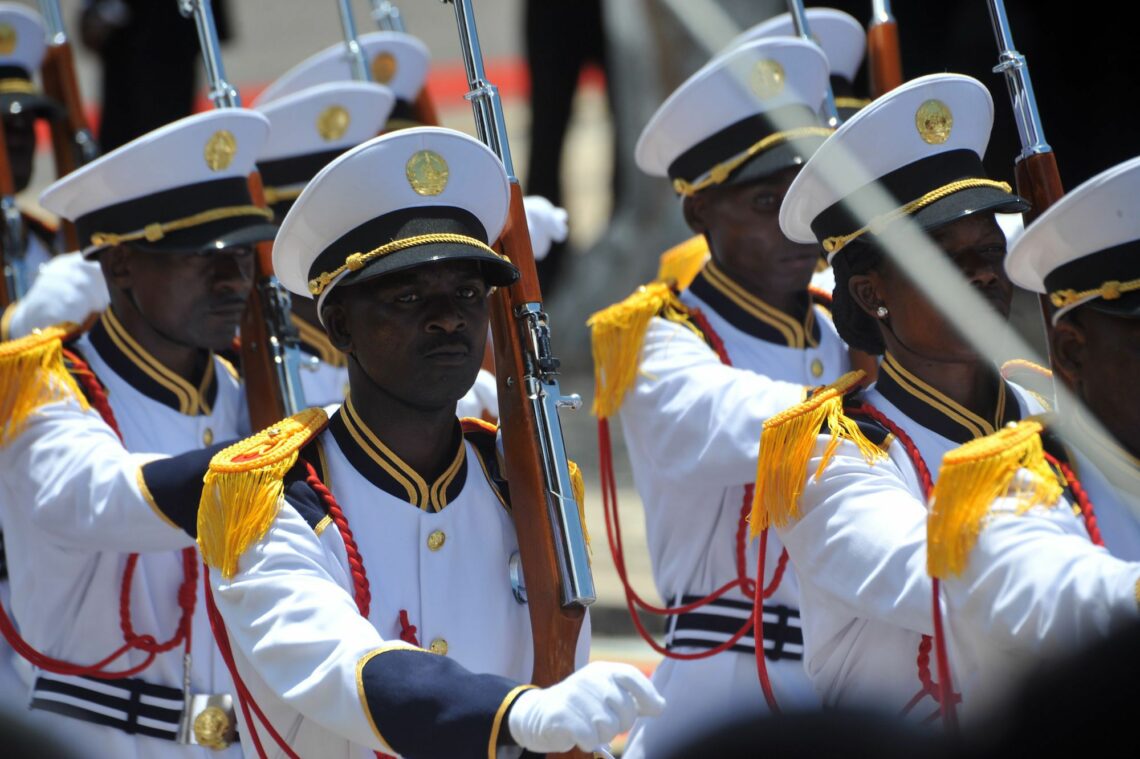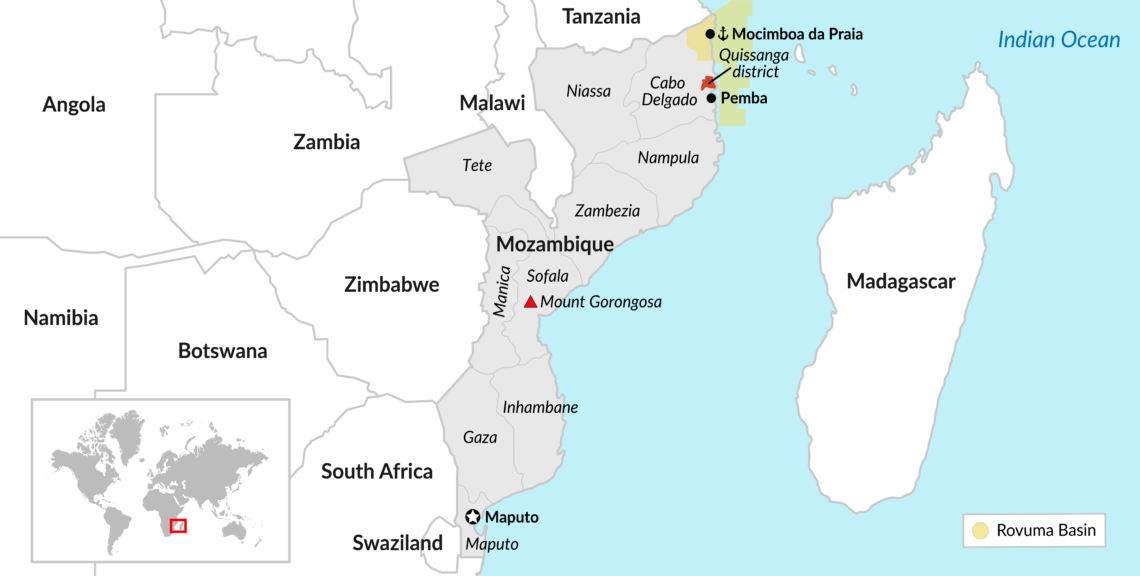From hope to escalating risks
Mozambique is facing one of its most difficult security challenges since gaining independence in 1975. Daesh-linked terrorism in the north, Russian pressure on the country’s gas reserves and heavy blows by the pandemic inevitably point toward regional military intervention.

In a nutshell
- Jihadist terrorism is escalating in Mozambique's north
- Key gas fields are at risk as thousands are killed or displaced
- A poor domestic response may prompt regional intervention
Mozambique is facing one of its most difficult security challenges since its independence in 1975. Jihadist terrorist activities in the northern province of Cabo Delgado have been escalating, reaching new highs in recent months and weeks.
The violence erupted in October 2017, when police stations were attacked in the city of Mocimboa da Praia and soon spread elsewhere in the province. Between Palma, the onshore center of natural gas exploration and liquefaction, and Pemba, the provincial capital city, bands of self-proclaimed Islamic State fighters have been attacking villages.
The Daesh-linked terrorist group Ansar al-Sunna is believed to be behind the attacks. They have already claimed hundreds of lives; displaced around 250,000 individuals mostly middle-class and administrative cadres who took refuge in the province capital, Pemba. Approximately 700,000 people are facing a humanitarian crisis. Local populations have seen wrecked villages, abductions, torture, decapitations, and summary executions.
The government has not had an effective response. During the first two and half years of conflict, Maputo’s tactic to minimize the perception of risk was to label the problem as “banditry.” Only this year, given the insurgency’s growing operational capacity and the scale of the violence, has the government decided to ramp up its military resources on the ground. It has now declared the conflict “an external aggression perpetrated by terrorists,” turning it from a “public security” issue to one of “territorial integrity.”
But Mozambique’s defense forces (the FADM) have not been able to meet the threat. To the contrary, there are signs that some of its members are supplying weapons, ammunition, military uniforms and information to the insurgents. Without full confidence in some of his commanders, President Filipe Nyusi recently promoted a few young officers from major to lieutenant colonel rank – an unprecedented move justified by the urgent need for new military leadership at the operational level.
Facts & figures

Boots on the ground
In another drastic measure, the government has resorted to the help of foreign security forces. Mercenaries from the Wagner Group, a Russian paramilitary organization, were first hired, but their ignorance of the local language and customs as well as operational results led to the end of their intervention in early 2020. Still, Russia may attempt a comeback on the scene, as Moscow wants to expand its mining and energy exploration activities in East Africa. The current Mozambican environment favors the Kremlin’s strategy of helping unstable political regimes – like Sudan, Ethiopia and Somalia – as an entry point into East Africa, a region with huge untapped mining deposits.
In 2019, Rosneft, the largest Russian state oil company, established a cooperation protocol with the National Hydrocarbons Company of Mozambique (ENH) for the joint exploration of natural gas. Nordgold, a mining company, has also been seeking concessions in Cabo Delgado. In exchange, Moscow may help support counterterrorism efforts using private security companies. Mercenaries may therefore get an opportunity to protect Russian economic interests in the region, which would allow the Kremlin to compete with China and the United States while avoiding direct involvement. In January 2020, Cuban military specialists in counterintelligence arrived in Maputo to train Mozambican officers. The identification of FADM members allegedly involved in the attacks is thought to have come from these Cuban efforts.
Moscow wants to expand its mining and energy exploration activities in East Africa.
The South African firm Dyck Advisory Group (DAG), which has close links to Chinese and other foreign companies, is also on the ground. But its long-term involvement is not sure given certain restrictions imposed by South African legislation.
The escalating security risks could have long-term impacts in the region, justifying a regional military intervention. Indeed, authorities in Mozambique have already called for support in dealing with these security challenges, but at this point, this is not likely to occur.
The South African Development Community (SADC), the key actor responsible for ensuring regional stability, shows no sign of political will to answer the call. Regional partners face other priorities, particularly given the Covid-19 pandemic that has hit some of them very hard. South Africa, the country with the greatest response capacity, is the most severe case, while the majority of SADC members lack the resources to guarantee the intervention.
Economic headwinds
Mozambique’s economic potential has attracted significant investments in multiple sectors. But its natural gas reserves have come to dominate the attention of prominent international economic groups. Near Cabo Delgado, the Rovuma Basin is one of the richest natural gas regions in the world.
The presence of Islamic fundamentalists could have direct implications for operating LNG companies. For now, there is no evidence suggesting the terrorists have or are likely to target any oil or gas company, but the possibility cannot be ruled out. ExxonMobil and Total have already withdrawn their personnel from critical areas. While none have indicated their intention of leaving, some have suspended their onshore exploration programs while others have postponed their final investment decisions.
The northern Rovuma Basin is one of the richest natural gas regions in the world.
On the other hand, in mid-July, the African Development Bank announced a $20 billion financing agreement regarding the TOTAL-led consortium Mozambique LNG project — the largest ongoing private investment in Africa, and cause for optimism about future prospects. But in addition to the security concerns, the consequences of Covid-19 (starting with the expected fall of prices in the world gas market) could harm the consortium’s projections.
Discouraging investment
Given the government’s difficulty in addressing the terrorist threat, foreign companies are considering taking responsibility for securing the areas where they operate by hiring private military contractors. On top of difficulties with the state’s security apparatus, this solution will substantially raise the costs of the gas projects. Insurance costs, too, will rise if the area is considered at risk due to terrorism.
The mining sector also faces risks, as does communications and transport infrastructure. The most recent attacks indicate that the terrorist groups are gradually moving southward, to the Nampula province. If this trend continues, it may bring terrorist cells into direct contact with the Nacala railway line and the Nacala Port – some of Mozambique’s most important strategic assets, and largely unprotected.
For now, this remains unlikely; for tactical reasons, the north remains the epicenter of the terrorist threat. But if the ramp-up of security elements pushes the groups out of northern areas, the most likely place for them to retreat to would be either Tanzania (which has already strengthened its borders), or the Nampula province. This potential risk should be noted. Moreover, if the terrorist groups’ intention is to disrupt economic activities that benefit the government, a potential target could be the extractive sector or the Nacala Port itself.
Old grievances
For 16 years, Mozambique was in a civil war between the then-communist, FRELIMO party, led by Samora Machel, and the RENAMO insurgents, headed by Afonso Dhlakama. Peace came in 1992, and RENAMO became a regular opposition force.
Since then, the two parties have had strained relations. Tensions peaked in 2012, when Mr. Dhlakama returned to his former guerrilla headquarters, in Mozambique’s central area, accusing FRELIMO of marginalizing the opposition. Key aspects of the 1992 peace accord had also remained unresolved, namely the integration of RENAMO fighters into the state’s military and security apparatus. The center of the country was again hit by low-intensity guerrilla warfare.
Eight years passed, and with RENAMO now led by Ossufo Momade (following Mr. Dhlakama’s death – with whom incumbent president Filipe Nyusi negotiated another peace deal) – the situation remains precarious. That is especially true after a dissident wing of the RENAMO guerrilla force, headed by General Mariano Nhongo, engaged in strong opposition to both RENAMO’s leadership and FRELIMO, resorting to violent actions.
The eruption of violence in other parts of the country could be exploited by today’s terrorist groups, forcing the government to divide its security resources – likely becoming more vulnerable and less effective.
Tribal problems also play their part in feeding the conflict. The two main tribes of Cabo Delgado are the Macondes and the Mwanis. The former were once the main guerrilla fighters against the Portuguese, and today they have a strong hand in the ruling party and the security apparatus, despite being a minority group. The latter – Muslim, demographically dominant in Cabo Delgado, and with a patrilineal tradition that renders them more open to jihadist faith – are old enemies of the Macondes, who over time marginalized the Mwanis. Moreover, the Mwanis’ major source of income and way of living are deeply linked to coastal resources and culture, which are now seriously threatened by the oil and gas camps from which they have benefited very little. In short, the context is a long-rooted, unequal distribution of political and economic power, which, over time, set the stage for conflict. These old grievances could be exploited by the jihadists, especially when it comes to seducing and recruiting the local population.
Roots of the conflict
When violence first erupted, Mozambique’s government deliberately ruled out the possibility of jihadist terrorism. Scapegoats were found in private interests, entrepreneurs and artisanal miners. There were also allusions to a master plan involving competing international players to hamper Mozambique’s gas projects. (This is not entirely unfounded; one such player would be Qatar, a great LNG producer allegedly interested in undermining future competition from Mozambique.)
At its core, the Ansar al-Sunna group is mainly composed of young Muslims from Cabo Delgado who faced declining job opportunities and an increasingly uncertain future. The promise of effective financial support and appealing jihadist propaganda makes this segment of the population an easy recruitment target. But the most recent attacks are very clear as to the faith, loyalty and commitment of the perpetrators to jihadism, and their links to foreign groups.
Old tribal grievances may be exploited by the jihadists, especially in recruitment.
Ansar al-Sunna is believed to be financially supported by organized crime networks, smuggling and human trafficking, with many being sent as recruits to training camps in the Democratic Republic of Congo, Sudan and Somalia. It is believed that the group’s leaders maintain strong religious and military ties with other fundamentalist groups in Kenya, Tanzania, the Great Lakes region and Somalia.
Ideology and religion are part of the equation. Nevertheless, the group’s activities seem to disguise criminal and money related purposes expressed and materialized through assaults, extortions and kidnappings, similar to other cases registered below the Sahel Region.
Scenarios
Natural gas has been feeding Mozambique’s growth and development prospects. Instability and terrorism threaten such goals, and therefore the government strives to stop them.
Deterioration of security situation
However, in the short run, the security situation is likely to deteriorate further, considering:
- The government’s response, which relies heavily on repression, arbitrary arrests, extrajudicial killings and violence toward civilians suspected of collaboration (despite President Nyusi’s efforts to moderate their actions). This further alienates an already disenfranchised population, raising fear and increased distrust in government, favoring the insurgents.
- The FADM are ill-prepared, not trained in counterterrorism and lack the necessary equipment and intelligence to successfully counter the terrorists alone.
- The insurgents have greater operational capacity. The pace and scope of the attacks has not been reduced, an initially unsophisticated MO has been upgrading, and insurgents are becoming more and better equipped, suggesting an evolution in tactics. The informal and highly mobile structure of the cells also makes their neutralization difficult.
- New fighters are likely to continue to come in as the group further exploits an economically frustrated youth, unemployment, poverty, and growing discontent with government abuses on civil population. ISIS propaganda could also advance cross-border recruitment.
Regional military intervention
The best chance for a different scenario in the short run is regional military intervention. But, as discussed, this is not likely to happen unless two factors come into play:
- If safeguarding foreign investment, which is increasingly exposed to growing terrorist threats, tops international partners' top priorities of Mozambique, an external military intervention to face these security challenges becomes more likely.
- Increased displacement, food insecurity, and starvation could create unbearable economic and social pressure in neighboring countries.
Most insurgencies take around three to five years to establish themselves and consolidate. Allegedly created in 2015 and integrated with ISIS in 2019, now is a crucial moment to halt Ansar al-Sunna’s momentum. If not, the most likely outcome will be for the group to become an entrenched, long-term problem – opening the door to more complex long-term security challenges for Mozambique.
Research suggests that when a group survives this initial phase, the conflict could last around 10 years, and if counterstrategies continue to fail it could be further protracted. The group could gain control over more territory and resources. Aggravating the situation, the group’s success could attract attention from ISIS affiliates in other parts of Central and East Africa, favoring deeper ties with foreign radical groups. All of this is now possible in Cabo Delgado given the failure of the government’s response and the lack of regional support.
But military action alone, while crucial in the short term, will not eliminate the security threat in Cabo Delgado. In the long run, this will only be achieved if the underlying causes are tackled: by addressing the northern populations’ rooted grievances, needs and expectations. An ideal scenario for long-term peace and stability requires political will and would probably undermine long-established vested interests, rendering such a scenario less likely.
Over the weekend of August 14, alarming news of a jihadist takeover of the Mocimboa da Praia port began to spread. Already, it is clear that all non-Muslim inhabitants have left the city. The ever-rising security challenges in Mozambique make it more likely that the insistent rumors about American and French plans to patrol the coast will materialize.








